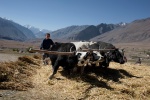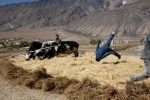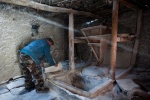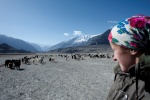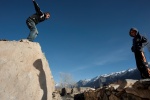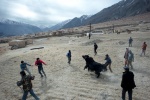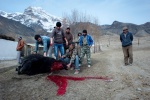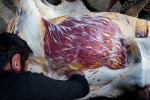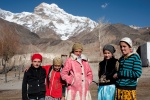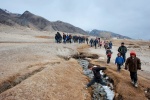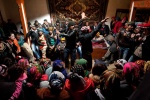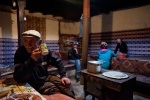Every morning, professor Sarabdek goes to his garden to look at his mountain. In the air you feel first the crisp Pamirian cold, but the real winter and snow up to a man’s waist is coming later in January. The mountain above the village is his favorite. He does not know why. Maybe because its snow hood is powerful and dignified. She is the pride of the whole village Roshorv. The professor stubs out his cigarette and goes home. His daughter tosses water around the entrance and begins to sweep. It is dusty here all the time. This Pamir Mountains are a snowless desert. The dry, crisp air chokes. Inhaling deeper you get the impression that your lungs begin to cover with a thin layer of sparking frost. Winter is coming. Frost nips in the face. Local cover their faces with scarves to protect them from the cold wind and dust. Dust rises suddenly, without notice. Sometimes you do not know what is worse: the frost nipping your face or sand or in the eyes and your chattering teeth.Professor Sarabdek has been retired for 6 years. Before he was an English teacher in the Roshorv village, just like his father just as his sons and daughter. His family comes from the Bartang, as for many generations have before. The professor was born in 1950. He does not remember his mother. She died when he was a year or two old. At the age of 4, his family was resettled by the Soviets to collect cotton in lowlands of Kum Sangiru. However, people were not used to the high temperatures of 40 degrees and they began to die. They sent a letter to Stalin asking for permission to return. This time, Stalin turned out to be gracious, and after three years of resettling, they returned to Roshorv. As a young man, he studied in a capital city of Dushanbe serving in the Soviet Army. He had the privilege to do his military service in warm countries of the Union: Azerbaijan, Dagestan and Georgia. After his service he returned to his mountains. He married a doctor and together they had 10 children."When was better USSR or present? "Why talk about the past if the world goes forward? At the time of the Soviet Union, religion was forbidden and people were fired from work if practiced. Farmers could raise animals only for personal use, but not more than 20 sheep or goats. They could not have horses or bulls. Today, you may have them as many as you want. Earlier medical care was free, and in severe cases, doctors sent a telegraph to Dushanbe requesting a helicopter. Nowadays, you have to pay for health care. Fortunately, there is the Agha Khan Foundation, which helps and covers half of cost of treatment. It might also send a new helicopter soon. During Soviet times, every local initiative was destroyed. There was a physics teacher who built hydro plant for his own use. Men came and order him to stop it" Now Sarabdek thinks about another solution: heating his house with bio gas. Electricity in Roshorv is not very reliable, but is free. It is only enough for lights in the evenings. Wood in Roshorv is precious, because it is rare. The Pamir is a mountainous desert and except for a few poplars and willows nothing will to grow. Women pick up all branches and twigs, sweep leaves and stalks and put everything in a stove. Men get up at dawn and set off into the mountains in search of firewood. It is hard to find something bigger than twigs and small branches. Men wander kilometers collecting anything that will burn. To get thicker wood they need to ride two days away, to the border with Kyrgyzstan. Therefore hills, farms and farmland are tidy as like an English garden. The spaces are wild and natural, but you will not find a withered twig.Sarabdek’s dream is to plant as many trees as possible. He plants them everywhere. At the airport, where His Holiness the Aga Khan arrived, he planted apricots trees and arrow poplars. Above stream near a mill, he planted willows and poplars. He just doesn’t plant along fields, as shaded patch of frost destroys crop, and here it is very hard to cultivate anything. At this altitude of 3000 m the strong wind allows only cereal, potatoes, carrots and onions to grow. Life in the village happens slowly, according to the seasons and the rights of nature. In the spring, potatoes are planted and cereals are sown. Summer is harvest time and in the autumn men mill their flour before the water powering the mill freezes over. During the winter, weddings are organized. The only public work in the village is teaching. People live from their agriculture and money sent from Russia. From selling their animals or knitted goods they can buy oil, sugar and rice. From an economic point of view, it is one of the poorest regions of the former Soviet Union, however they are very sociable, hospitable and community spirited. Roshorv village is made up of the Ismaili, common throughout the Tajik Pamir. The Ismaili are a progressive branch of Islam, labeling them to other groups as heretics. For centuries persecuted, they found their refuge in the mountainous regions of Asia: Pakistani and Afghani Hindu Kush, Iran, and here in the Tajik Pamir. Khorog, home to 28,000 is one of the biggest Ismaili cities. The rest are scattered in villages in the mountains. Ismailis don’t have mosques, but houses of prayer. In small villages like Roshorv, one of people’s homes can become a prayer one for an evening. In the mountains people pray in a silence. Faith is a matter of personal spiritual development. Their spiritual leader is the Agha Khan, educated and living in the west. The 49th imam instructs his followers to follow the ways of the present day. He urges people to learn English, as it is considered to be a language of science and to learn to use computers, themselves a tool for learning. Aga Khan helps here a lot. He builds schools, hospitals and bridges. During the civil war and recent riots in 2012, he called for peace and not taking arms. In the place where there is no mobile phone connection and newspapers come late, today during a dinner, we talked about the referendum in Scotland and the Russia invasion in the Crimea. At night, wolves approach the village and you hear dogs barking for long time. Tonight they caught one sheep.
All images © Karolina Samborska




